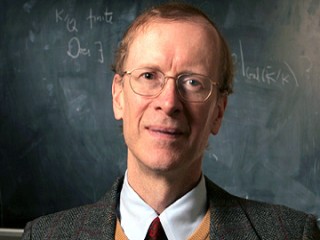
Andrew Wiles biography
Date of birth : 1953-04-11
Date of death : -
Birthplace : Cambridge, England
Nationality : British
Category : Science and Technology
Last modified : 2010-10-07
Credited as : Mathematician, has an IQ of 170 , professor at Princeton University
13 votes so far
Early life and education
Andrew Wiles is the son of Maurice Frank Wiles (1923–2005), the Regius Professor of Divinity at the University of Oxford and Patricia Wiles (née Mowll). His father worked as the Chaplain at Ridley Hall, Cambridge, for the years 1952-55. Wiles was born in Cambridge, England, in 1953, and he attended King's College School, Cambridge, and The Leys School, Cambridge.
Wiles discovered Fermat's Last Theorem on his way home from school when he was 10 years old. He stopped by his local library where he found a book about the theorem. Puzzled by the fact that the statement of the theorem was so easy that he, a ten-year old, could understand it, he decided to be the first person to prove it. However, he soon realized that his knowledge of mathematics was too small, he abandoned his childhood dream, until 1986, when he heard that Ribet had proved Serre's ε-conjecture and therefore established a link between Fermat's Last Theorem and the Taniyama-Shimura conjecture.
Wiles earned his bachelor's degree in mathematics in 1974 after his study at Merton College, Oxford, and a Ph.D. in 1980, after his research at Clare College, Cambridge.
After a stay at the Institute for Advanced Study in New Jersey in 1981, Wiles became a professor at Princeton University. In 1985-86, Wiles was a Guggenheim Fellow at the Institut des Hautes Études Scientifiques near Paris and at the École Normale Supérieure. From 1988 to 1990, Wiles was a Royal Society Research Professor at Oxford University, and then he returned to Princeton.
In October 2009 it was announced that Wiles would once again become a Royal Society Research Professor at Oxford in 2011.
Mathematical career
Wiles's graduate research was guided by John Coates beginning in the summer of 1975. Together these colleagues worked on the arithmetic of elliptic curves with complex multiplication by the methods of Iwasawa theory. He further worked with Barry Mazur on the main conjecture of Iwasawa theory over the rational numbers, and soon afterward, he generalized this result to totally real fields.
The proof of Fermat's Last Theorem
Starting in the summer of 1986, based on successive progress of the previous few years of Gerhard Frey, Jean-Pierre Serre and Ken Ribet, Wiles realised that a proof of a limited form of the modularity theorem might then be in reach. He dedicated all of his research time to this problem in relative secrecy. In 1993, he presented his proof to the public for the first time at a conference in Cambridge. In August 1993, however, it turned out that the proof contained a gap. In desperation, Andrew Wiles tried to fill in this gap, but found out that the error he had made was a very fundamental one. According to Wiles, the crucial idea for circumventing, rather than closing this gap, came to him on 19 September 1994. Together with his former student Richard Taylor, he published a second paper which circumvented the gap and thus completed the proof. Both papers were published in 1995 in a special volume of the Annals of Mathematics.
Recognition by the media
His proof of Fermat's Last Theorem has stood up to the scrutiny of the world's mathematical experts. Wiles was interviewed for an episode of the British Broadcasting Corporation's documentary series Horizon that focused on Fermat's Last Theorem. This was renamed "The Proof", and it was made an episode of the Public Broadcasting Service's television science TV series Nova. Since 1994 he has been Eugene Higgins Professor at Princeton and is currently Chair of the Mathematics Department. He is a foreign member of the United States National Academy of Sciences since 1996. He remains a citizen of the United Kingdom.
Awards
Wiles has been awarded several major prizes in mathematics and science:
* Junior Whitehead Prize of the LMS (1988)
* Fellow of the Royal Society (1989)
* Schock Prize (1995)
* Fermat Prize (1995)
* Wolf Prize (1995/6)
* National Academy of Sciences Award in Mathematics from the American Mathematical Society (1996)
* Royal Medal (1996)
* Ostrowski Prize (1996)
* Cole Prize (1997)
* Wolfskehl Prize (1997)
* A silver plaque from the International Mathematical Union (1998) recognizing his achievements, in place of the Fields Medal, which is restricted to those under 40 (Wiles was born in 1953 and proved the theorem in 1994)
* King Faisal Prize (1998)
* Clay Research Award (1999)
* Shaw Prize (2005)
* Pythagoras Award (Croton, 2004)
















